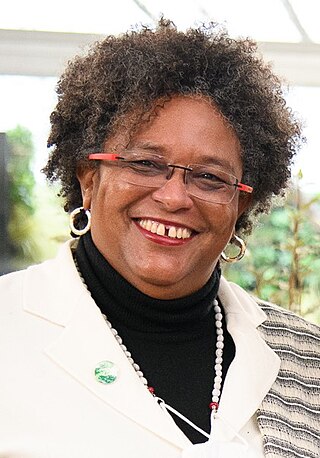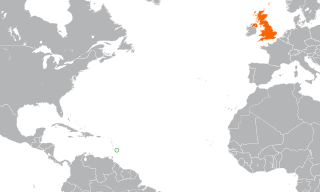| |||||
| Decades: | |||||
|---|---|---|---|---|---|
| See also: | |||||
Events in the year 2021 in Barbados .
| |||||
| Decades: | |||||
|---|---|---|---|---|---|
| See also: | |||||
Events in the year 2021 in Barbados .

Barbados is an island country in the southeastern Caribbean Sea, situated about 100 miles (160 km) east of Saint Vincent and the Grenadines. Roughly triangular in shape, the island measures some 21 miles (34 km) from northwest to southeast and about 14 miles (23 km) from east to west at its widest point. The capital and largest town is Bridgetown, which is also the main seaport.

The politics of Barbados function within a framework of a parliamentary republic with strong democratic traditions; constitutional safeguards for nationals of Barbados include: freedom of speech, press, worship, movement, and association.

The governor-general of Barbados was the representative of the Barbadian monarch from independence in 1966 until the establishment of a republic in 2021. Under the government's Table of Precedence for Barbados, the governor-general of Barbados was regarded as being the most important of all personnel of the Barbados government.

The House of Assembly of Barbados is the lower house of the bicameral Parliament of Barbados. It has 30 Members of Parliament (MPs), who are directly elected in single member constituencies using the simple-majority system for a term of five years. The House of Assembly sits roughly 40–45 days a year and is presided over by a Speaker.

The Cabinet are individuals of Barbados which execute the duties of the Government of Barbados. Under a Parliamentary republic, these powers are vested nominally by the President of Barbados, but are exercised in practice by a Cabinet of Ministers, presided over by the Prime Minister of Barbados. The Prime Minister is formally appointed by the President: the President must appoint, as Prime Minister, someone who can control a majority of votes in the House of Assembly. In practice, this is normally the leader of the largest political party or coalition in the house. When there is no clear majority, the president assumers the role of arbitrator and opens negotiations with the leaders of the various political parties, in the hope of finding someone whom a majority will accept as Prime Minister. In the event of that failing to take place, the President must dissolve the House of Assembly and call an early election.
On 30 November 2021, Barbados transitioned from a parliamentary constitutional monarchy under the hereditary monarch of Barbados to a parliamentary republic with a ceremonial indirectly elected president as head of state. The prime minister remained head of government while the last governor-general, Dame Sandra Mason, was elected as the country's first president on 20 October 2021, and took office on 30 November 2021.

The monarchy of Barbados was a system of government in which a hereditary monarch was the sovereign and head of state of Barbados from 1966 to 2021. Barbados shared the sovereign with the other Commonwealth realms, with the country's monarchy being separate and legally distinct. The monarch's operational and ceremonial duties were mostly delegated to her representative, the governor-general of Barbados.

Mia Amor Mottley, is a Barbadian politician and attorney who has served as the eighth prime minister of Barbados since 2018 and as Leader of the Barbados Labour Party (BLP) since 2008. Mottley is the first woman to hold either position. She is also Barbados' first prime minister under its republican system, following constitutional changes she introduced that abolished the country's constitutional monarchy.

The historical ties between the governments of Barbados and the United Kingdom of Great Britain and Northern Ireland (UK) are long and complex, including settlement, post-colonialism and modern bilateral relations. The two countries are related through common history spanning 339 years (1627–1966). Since the Barbadian date of political independence, these nations continue to share ties through the Commonwealth of Nations. Until becoming a Commonwealth republic in 2021, Barbados also shared the same Head of State, with Queen Elizabeth II as their Monarch.
The following is the Barbadian Table of Precedence.

The Constitution of Barbados is the supreme law under which Barbados is governed. The Constitution provides a legal establishment of the Government of Barbados, as well as legal rights and responsibilities of the public and various other government officers. The Constitution which came into force in 1966 was amended in 1974, 1980, 1981, 1985, 1989, 1990, 1992, 1995, 2000, 2002, 2003, 2005, 2007, 2009, 2010, 2018, 2019, 2020 and 2021. The 1966 document succeeds several other documents concerning administration of Barbados. One of them, the Barbados Charter, is discussed in the present Constitution's Preamble. Prior statutes were created for the administration of Barbados as a colony. As a former English and later British colony, the Constitution is similar to those of other former Commonwealth realms, yet distinctly different in the spirit of the Statute of Westminster.

Dame Sandra Prunella Mason is a Barbadian politician, lawyer, and diplomat who is serving as the first president of Barbados since 2021. She was previously the eighth and final governor-general of Barbados from 2018 to 2021, the second woman to hold the office. On 20 October 2021, Mason was elected by the Parliament of Barbados to become the country's first president, and took office on 30 November 2021, when Barbados ceased to be a constitutional monarchy and became a republic.
This article lists events from the year 2020 in Barbados.
The following lists events that happened during 2021 in the Caribbean.

The president of Barbados is the head of state of Barbados and the commander-in-chief of the Barbados Defence Force. The office was established when the country became a parliamentary republic on 30 November 2021. Before, the head of state was Elizabeth II, Queen of Barbados, who was represented on the island by a governor-general. The first and current president is Sandra Mason, who previously served as the last governor-general.

The 2021 Barbadian presidential election was held on 20 October 2021 to choose the first president of Barbados, an office established as part of Barbados becoming a republic. Sandra Mason, the incumbent governor-general of Barbados, was elected president, and she replaced Queen Elizabeth II as head of state of Barbados when she was sworn in on 30 November 2021.

General elections were held in Barbados on 19 January 2022 to elect the 30 members of the House of Assembly. The ruling Barbados Labour Party won all 30 seats for the second consecutive election.
Events in the year 2022 in Barbados.
Events in the year 2023 in Barbados.

The Constitution (Amendment) Act, 2021 is an act that amended the Constitution of Barbados to replace the Monarchy of Barbados as the country's Head of State with the office of the President of Barbados thereby transitioning its form of governance from a monarchy to a republic. Under the Act all of the functions previously performed by the Monarch and their Governor-General were transferred to the president. The amendment was passed on the 6 October 2021 with its commencement via proclamation being 11 October 2021 and 30 November 2021 . Its long title was:
An Act to alter the Constitution in order
(a) to provide for Barbados to become a republic with a President who shall be Head of State of Barbados; and
(b) to provide for related matters.